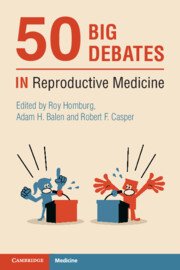Book contents
- 50 Big Debates in Reproductive Medicine
- Series page
- 50 Big Debates in Reproductive Medicine
- Copyright page
- Contents
- Contributors
- Foreword
- Introduction
- Section I Limits for IVF
- 1A Female Age 42 Years Should Be the Upper Limit for Conventional IVF/ICSI Treatment
- 1B Female Age 42 Years Should Be the Upper Limit for Conventional IVF/ICSI Treatment
- 2A Women with a BMI over 40 Should Be Refused Fertility Treatment
- 2B Women with a BMI over 40 Should Be Refused Fertility Treatment
- 3A Female Age of Menopause Is a Fair Limit for Ovum Donation
- 3B Female Age of Menopause Is a Fair Limit for Ovum Donation
- 4A Social Egg Freezing Should Be Available Up To the Age of 40 Years
- 4B Social Egg Freezing Should Be Available Up To the Age of 40 Years
- Section II IVF Add-ons
- Section III The Best Policy
- Section IV Embryology
- Section V Ethics and Statistics
- Section VI Male-factor Infertility
- Section VII Genetics
- Section VIII Ovarian Stimulation
- Section IX Hormones and the Environment
- Index
- References
4A - Social Egg Freezing Should Be Available Up To the Age of 40 Years
For
from Section I - Limits for IVF
Published online by Cambridge University Press: 25 November 2021
- 50 Big Debates in Reproductive Medicine
- Series page
- 50 Big Debates in Reproductive Medicine
- Copyright page
- Contents
- Contributors
- Foreword
- Introduction
- Section I Limits for IVF
- 1A Female Age 42 Years Should Be the Upper Limit for Conventional IVF/ICSI Treatment
- 1B Female Age 42 Years Should Be the Upper Limit for Conventional IVF/ICSI Treatment
- 2A Women with a BMI over 40 Should Be Refused Fertility Treatment
- 2B Women with a BMI over 40 Should Be Refused Fertility Treatment
- 3A Female Age of Menopause Is a Fair Limit for Ovum Donation
- 3B Female Age of Menopause Is a Fair Limit for Ovum Donation
- 4A Social Egg Freezing Should Be Available Up To the Age of 40 Years
- 4B Social Egg Freezing Should Be Available Up To the Age of 40 Years
- Section II IVF Add-ons
- Section III The Best Policy
- Section IV Embryology
- Section V Ethics and Statistics
- Section VI Male-factor Infertility
- Section VII Genetics
- Section VIII Ovarian Stimulation
- Section IX Hormones and the Environment
- Index
- References
Summary
Many women who are deciding on fertility preservation (FP) are doing so at an advanced reproductive age, probably because this option has become available relatively recently, or due to the lack of awareness in young women about the depletion of the ovarian reserve and its effects on fertility. Recent studies show that age is the most powerful variable related to success after FP, which directly affects the number of oocytes vitrified, oocyte survival and cumulative live birth rate, with highest outcomes achieved by women aged ≤35y. Nonetheless, women in the ‘over 40’s’ can also succeed with their vitrified oocytes, although their probability of success is extremely low. An individualised treatment in older women, together with a comprehensive explanation of their situation to avoid creating false expectations, would be more advisable in order to set an age limit at 40 and deny the opportunity to these women. Likewise, women should be encouraged to decide on FP at young ages, when the chances are significantly higher.
Keywords
- Type
- Chapter
- Information
- 50 Big Debates in Reproductive Medicine , pp. 19 - 21Publisher: Cambridge University PressPrint publication year: 2021



